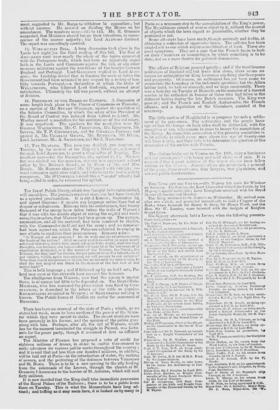The fire of Polish liberty, which was thought lobe extinguished,
still smoulders. The journals received since our last have brought us a spirited proclamation. It is dated Kunow, September 12, and signed Rozister : it speaks any language rather than that of despair or submission. Roars's' tells his countrymen, that twenty thousand of the enemy have fallen before the walls of Warsaw ; that it was with the double object of saving the capital and weak- ening the invaders, that Warsaw had been given up. The cannon, ammunition, and all the materiel, had been removed to Modlin, with the Commander-in-Chief and the army ; and an armistice had been agreed on, which the Poles are exhorted to employ in new efforts to establish their independence. ROZiSKI asks- " Is Warsaw all our country ? Do its walls and its inhabitants form the limits of the nation ? After so many sacrifices—after so many dearly achieved victories, which have justly astonished the world, shall our high thoughts, our feelings, our hopes—shall all these be at the last moment of expectation dissipated, as if the waters of the Warthe, the Vistula, the Dnieper, the Bug, and the Dwina, did not present to us the inheritance of our fathers, which, again reconquered, we will convey to our children ? 'Who then would treacherously violate the sacred oath we have sworn, to shed the last drop of our blood in the defence of the last foot of our native land?"
This is bold language ; and if followed up by as bold acts, Po- land may even at this eleventh hour reassert her honours. The intelligence from Warsaw, now that the enemy is master there, is of course but little to be depended on. The Grand Duke MICHAEL, who has assumed the place which was filled by CON- STANTINE, is described in the letters of the lath as popular. KRUKOWIECKI remained in Warsaw ; of SKRYZNECKI nothing is known. The Polish forces at Modlin are under the command of RYBINSKI.


























 Previous page
Previous page